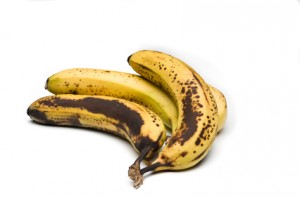Ah, pesticide.
 As much as I appreciate insight into agricultural processes, I’m not a fan of tasting the crop-dust on apples — or maybe it’s not chemicals, maybe I’m tasting the industrial plastic the apples were shipped in. Or the oil from 10,000 hesitant, collegiate fingers. Whatever’s in my mouth, it could use a bath.
As much as I appreciate insight into agricultural processes, I’m not a fan of tasting the crop-dust on apples — or maybe it’s not chemicals, maybe I’m tasting the industrial plastic the apples were shipped in. Or the oil from 10,000 hesitant, collegiate fingers. Whatever’s in my mouth, it could use a bath.
It’s hard to eat fruit in college, despite the University’s best attempts. There are baskets of fruit in almost every dining area, but I happen to be a picky eater. If I’m shelling out ninety-nine cents for a piece of fruit, I would like a banana longer than a tape dispenser, or an orange that’s less than half peel. And dammit, I want a pear now, not three weeks later when it’s sufficiently softened somewhere in my desk drawer. I think I might be getting the most modern case of scurvy to grace UR, all because of my disdain for the available sources of vitamin C.
I think everyone knows either scientifically or intuitively that fruit is good for you. They’ve been paired with veggies for as long as I can remember as a kind of miracle team for the human body, providing vitamins, minerals and other good stuff. However, while vegetables can be found in many dishes on campus, you kind of have to go out of your way to get fruit into the college diet.
Enter the fruit bins of the Pit, and the fruit piles of Douglass. I’ve seen mountains of apples, bananas, oranges, pears and plums.
Apples are pretty much the staple fruit on campus, but they come in many shapes and breeds. I’m no expert on apple types, but I know what I like and dislike about them. I’ve provided my guidelines below for your convenience.
Granny Smith: Occasionally mushy, but the bruises are easiest to spot against the green of the skin. I’m only let down when they aren’t particularly sour, but that’s just the flavor I prefer.
Golden Delicious: I’ve had great luck with these guys in the past because of their subtly sweet taste, which is satisfying even when the fruit’s deeply bruised. One of these did get my worst apple award, however; I had one that literally collapsed into mush in my mouth, like a browner version of a glacier crumbling into the sea.
Empire reds: Dark red and potentially awful. They’re generally the biggest for your buck, but they’re also the most likely to have that acidic taste, and it’s harder to spot bruising. On the other hand, when these are good, they’re the crispest and crunchiest specimens.
Gala: My standby. These are sweet, solid and dependable. I’ve never met a Gala I didn’t like, though immediately consuming them might be considered rude in some cultures.
Essentially, campus fruit is a mixed bag. I know there are reasons of economy and convenience for the kind of fruit the University provides, and frankly I’ll put up with an underripe banana if it keeps my tuition on the lower end of $51,000. After all, there are relatively easy ways to adapt to the failures of fruit.
For one thing, it’s a good idea to wash your fruit before you eat it. Though it would be nice to know that the University does this for you, but remember that even the cleanest apple is fair game to any set of germy fingers once it’s then put on display.
Also, you could drink juice to get your daily (or bi-weekly) serving of fruity goodness, thus bypassing the entire picky process of manual selection.
Yogurts are a source of dairy and fruit, if you go by route of Dannon. And for the optimistic among us, you can always keep selecting your servings by hand and learning to avoid the biggest duds, even if every so often . . .
Ah, pesticide.

